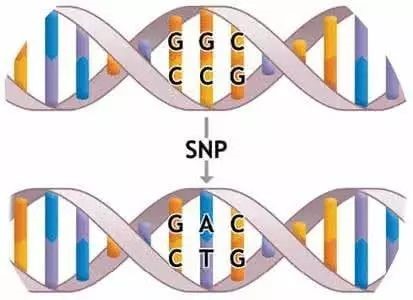After the American scholar Eric S. Lander formally proposed single nucleotide polymorphism (SNP) as the third-generation molecular marker in 1996, SNP has been widely used in economic trait association analysis, biological genetic linkage map construction, and human pathogenic gene screening. , Disease risk diagnosis and prediction, individualized drug screening, and other biological and medical research fields. In the field of cash crop breeding, detection of SNP can realize early selection of required traits. This selection has the characteristics of high accuracy and can effectively avoid the interference of morphology and environmental factors, thereby greatly shortening the breeding process. Therefore, SNP plays a huge role in the field of basic research.
Single Nucleotide Polymorphism (Single Nucleotide Polymorphism, SNP) refers to the phenomenon that there are single nucleotide differences in the same position in the DNA sequence of individuals of the same or different species. The insertion, deletion, conversion and inversion of a single base can all cause this difference. In the past, the definition of SNP was different from that of mutation. A variant locus requires that the frequency of one of the alleles in the population is greater than 1% in order to be defined as a SNP locus. However, with the expansion of modern biological theories and the application of technology, allele frequency is no longer a necessary condition to limit the definition of SNP. According to the single nucleotide variation data included in the Single Nucleotide Polymorphisms (dbSNP) database under the National Center for Biotechnology Information (NCBI), low-frequency insertion/deletion, microsatellite variation, etc. are also included.
In the human body, the frequency of SNP is 0.1%. In other words, there is an average of one SNP site per 1000 base pairs. Although the frequency of occurrence is relatively high, not all SNP sites can be candidate markers related to traits. This is mainly related to the location where the SNP occurs.
Theoretically, SNP can occur anywhere in the genome sequence. SNPs occurring in the coding region can produce synonymous mutations and non-synonymous mutations, that is, the amino acid changes or not changes before and after the mutation. The changed amino acid usually causes the peptide chain to lose its original function (missense mutation), and may also cause translation abort (nonsense mutation). SNPs that occur in non-coding regions and intergenic regions may affect mRNA splicing, non-coding RNA sequence composition, and the binding efficiency of transcription factors and DNA. The specific relationship is shown in the figure:
SNP Types:
Several common SNP typing methods and their comparison
According to different principles, common SNP detection methods are divided into the following categories:
Classification comparison of detection methods
Note: Listed in the table are currently used more common SNP detection methods, other detection methods such as specific site hybridization (ASH), specific site primer extension (ASPE), single base extension (SBCE), specific site cutting ( ASC), gene chip technology, mass spectrometry technology, etc. have not been classified and compared.
The cost and time of nucleic acid purification in the above several common SNP detection methods are unavoidable. However, related kits based on Foregene’s direct PCR technology can directly perform PCR or qPCR amplification on unpurified samples, which brings unprecedented convenience to SNP detection.
Foregene’s direct PCR series products simply and roughly omit sample purification steps, which greatly reduces the time and cost required to prepare templates. The unique Taq polymerase has excellent amplification ability and can tolerate a variety of inhibitors from complex amplification environments. These characteristics provide a technical guarantee for obtaining high-yield specific products.Foregene Direct PCR/qPCR kits for various sample types, such as: animal tissues (rat tail, zebrafish, etc.), plant leaves, seeds (including polysaccharides and polyphenol samples), etc.
Post time: Jul-23-2021











